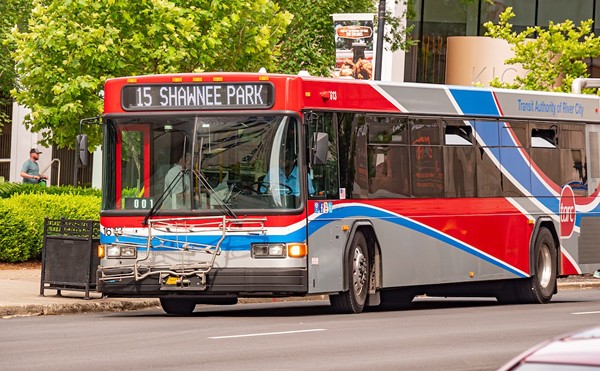Not So Easy
Regarding Summer Auerbach’s Locavore Lore piece from the Feb. 23 LEO Weekly: This is not a personal attack on the author of the article in question, but rather a critique of a particular assumption made in the “Portlanders do it better” piece.
I would argue that greenwashing is much more than the use of deceptive labels. Greenwashing occurs when we’re duped into believing we can use the market to exchange our way out of environmental catastrophe, and that a profit-based economy, i.e., capitalism, is compatible with sustainability, particularly if it is “local.”
Attempting to utilize a profit-driven market to solve the climate crisis — even feel-good “small-business”-based markets — is akin to asking a terminal illness to cure itself. A logical response might be that capitalism proper is the problem, rather than individual consumer behavior.
So-called informed dietary consumer choices require economic and — all too often — white privilege; due to the bloody history of slavery, colonialism and apartheid, most communities of color are impoverished. When all people have free access to the things they need for living — food, of course, being one of the most critical — we can have a conversation about nutrition.
The author seems genuinely concerned with what capitalism is doing to our food system, analyzing just one piece of the massive environmental degradation puzzle, i.e., the corporate control of the food supply that perpetuates covering plant-based foodstuffs with pesticides/herbicides; pumping livestock full of antibiotics and hormones; depleting soil; and creating runoff, entering bodies of water near factory farms. But this variety of environmentalism has heard its death knell as a form of resistance against corporate/nation-state hegemony. It will require candidly radical, confrontational perspectives, a grassroots movement embracing direct action from the bottom up and, to be sure, revolutionary tactics, to create real change. Resistance demands more of us than ordering the correct sustainable livestock in en vogue eateries.
Alex Bradshaw, Highlands
Ticket To Ride
In response to Jonathan Meador’s provocative article about a hypothetical rail project (LEO Weekly, Feb. 23) designed to link Lexington, Frankfort and Louisville that is in understudy by the Kentucky Capital Development Corp., allow me to suggest that an alternative to a single-occupant private car commute between Louisville and Frankfort already exists. For about 11 years, the Kentuckiana Regional Planning and Development Agency (KIPDA), which represents the governments in this bi-state metropolitan region and TARC, has developed a creative car pool and van pool operation that goes by a name taken from a successful 1965 Beatles song, “Ticket To Ride.”
KIPDA’s Kelly Tyra manages the 56 active van pools, as well as many car pools — some of which I believe serve the Louisville-to-Frankfort commute — at a monthly cost of about $75 for 21 days of commuting a month, which is the joint KIPDA-TARC program.
With regards to the situation of state employee Amanda Gatewood, there is an interesting question. Given the fact that her employer is the Kentucky Cabinet for Health and Family Services, why has no one at that state agency informed her of the existence of “Ticket To Ride”?
I urge both Tyra of KIPDA and J. Barry Barker of TARC to make certain that Gatewood and all Kentucky state employees working in Frankfort and living in Metro Louisville are made aware of “Ticket To Ride.” TARC, I believe, has the responsibility of generating business for “Ticket To Ride” through its Transportation Resource Center. I also suggest that state Rep. Tanya Pullin (D-98) contact the United Auto Workers Local 862 on how American-made auto products can better serve the nation and the commonwealth. The “Ticket To Ride” vans are all Fords.
The existence of a low-cost public sector program such as “Ticket To Ride” brings into question the need for another Kentucky public agency to speculate about a mythical commuter rail link connecting Lexington, Frankfort and Louisville. Why, at a time of budget restraint, would one want to waste money on a dubious rail link that has an estimated initial cost of $75 million and may pose a hazard on a line being used by freight trains, when a perfectly good but under-marketed, low-cost public program already exists?
David Eugene Blank, Highlands
Louisville Rail
It would be great to travel anywhere by train, but we ought to start local. What I don’t understand is why the city of Louisville and its assorted suburbs don’t have any kind of high-speed rail. It would make downtown Louisville — and, for that matter, the East End shopping centers — so much easier to get to.
As someone who has had to contend with the parking situation downtown, it sounds like one of those no-brainers to me.
Hank Sedgwick, New Albany
Bullying Bill
I support the original House Bill 370 that has added protection for our Kentucky kids from bullying based on sexual orientation. It is a necessary bill, because LGBT kids are more likely to be bullied and less likely to be protected. However, Rep. Mike Harmon added two amendments that may kill this necessary bill. One amendment added is irrelevant to the bill, and I feel was added due to a personal agenda that, frankly, has nothing to do with our kids being bullied. It is unconscionable to ride the coattails of our children.
The second amendment would allow continued verbal abuse/harassment of students based on their religious and sexual orientation. While this is America and it is necessary that we are all able to express our viewpoints, verbal abuse and harassment are two different scenarios. Verbal abuse and harassment seek to harm by creating emotional pain. Emotional pain is the end result of continuously repeated lies about someone. And, in cases of bullying, remarks are often fraught with hate speech. Hate speech is not expressing viewpoints, it is expressing hate. Come to think of it, when was the last time you saw a child or teen with the ability to simply express viewpoints without a degree of emotion? I have worked with kids/teens for many years and found they simply do not possess the degree of communication skills that an adult would have. Because of this simple reality, anti-bullying laws are necessary.
It is up to us (adults) to ensure children know the difference. Removing the amendment would also protect those children who may skew from merely expressing a viewpoint. They will know what is and is not acceptable in hopes they will not find themselves in trouble at school.
Tana J. Wright, Okolona
A Soldier’s War
“Support our troops” and do not think to question what or why.
“Support our troops” the slogan goes, who cares for what or why?
They said we were old enough to fight and win a war.
They said with smirks, “Support our troops,” but meant, “Support the war.”
Our elders made up that motto, their judgment pretty poor.
How could they think and say that we were up to win a war?
The president proclaimed and said: “This is our righteous cause.”
But since that time, we doubt and squirm and ponder at our pause.
We trained and sweated for a few months, then shipped off to attack.
God knows if we’ll be safe and sound or never coming back.
While we are here we are in deep doubt; death upon our mind.
We have become the victims here while others are so blind.
And now the folks at home are singing a different song.
The words like spears are sharp and true helping us right the wrong.
As we muddle through, feel death’s sting, we hear them loud and clear:
“Not in our name! Not one more death!” Their words to us are dear.
“Support our troops” and do not think to question what or why.
“Support our troops” the slogan goes, who cares for what or why?
Anthony P. Hasson, South End





